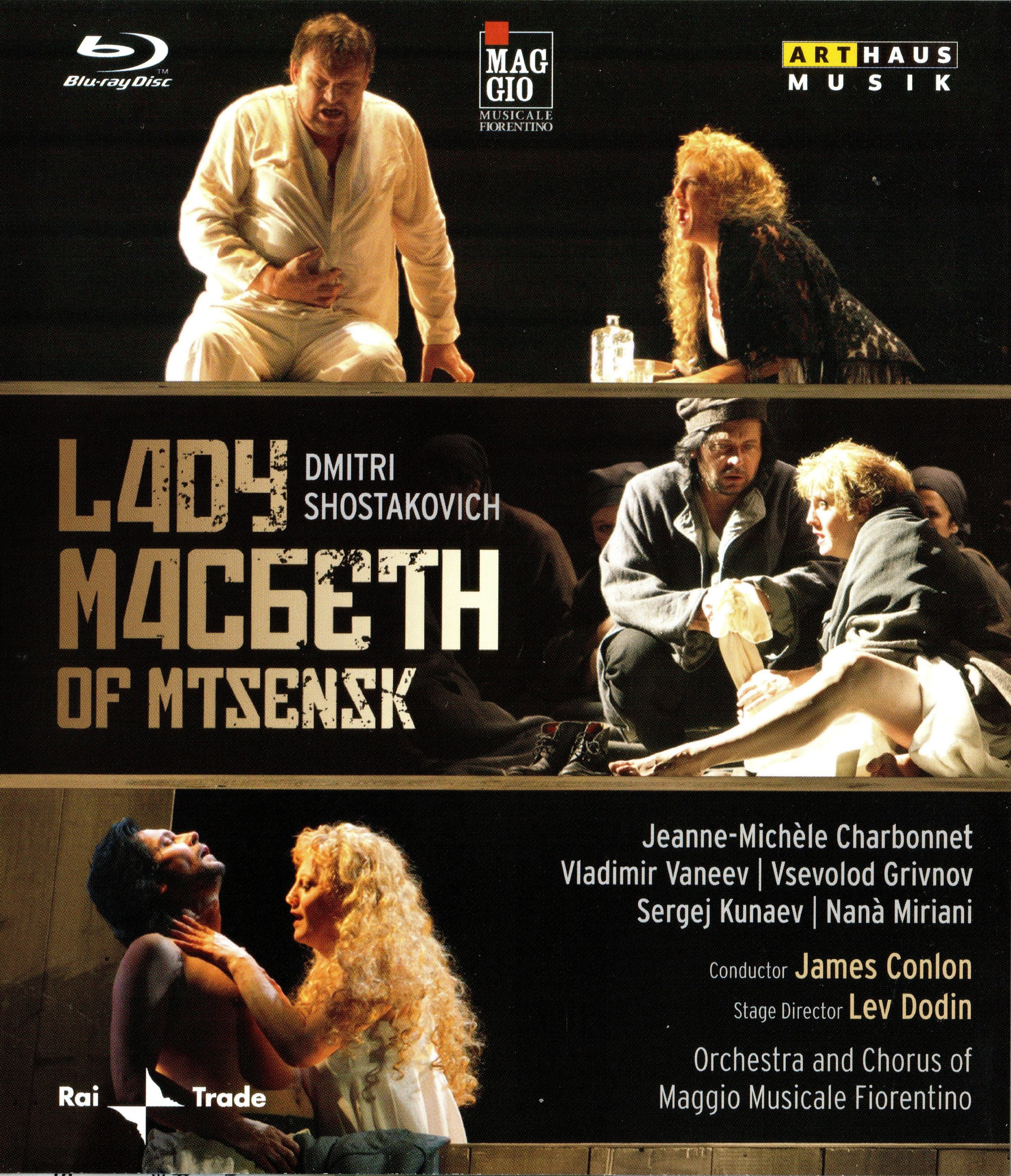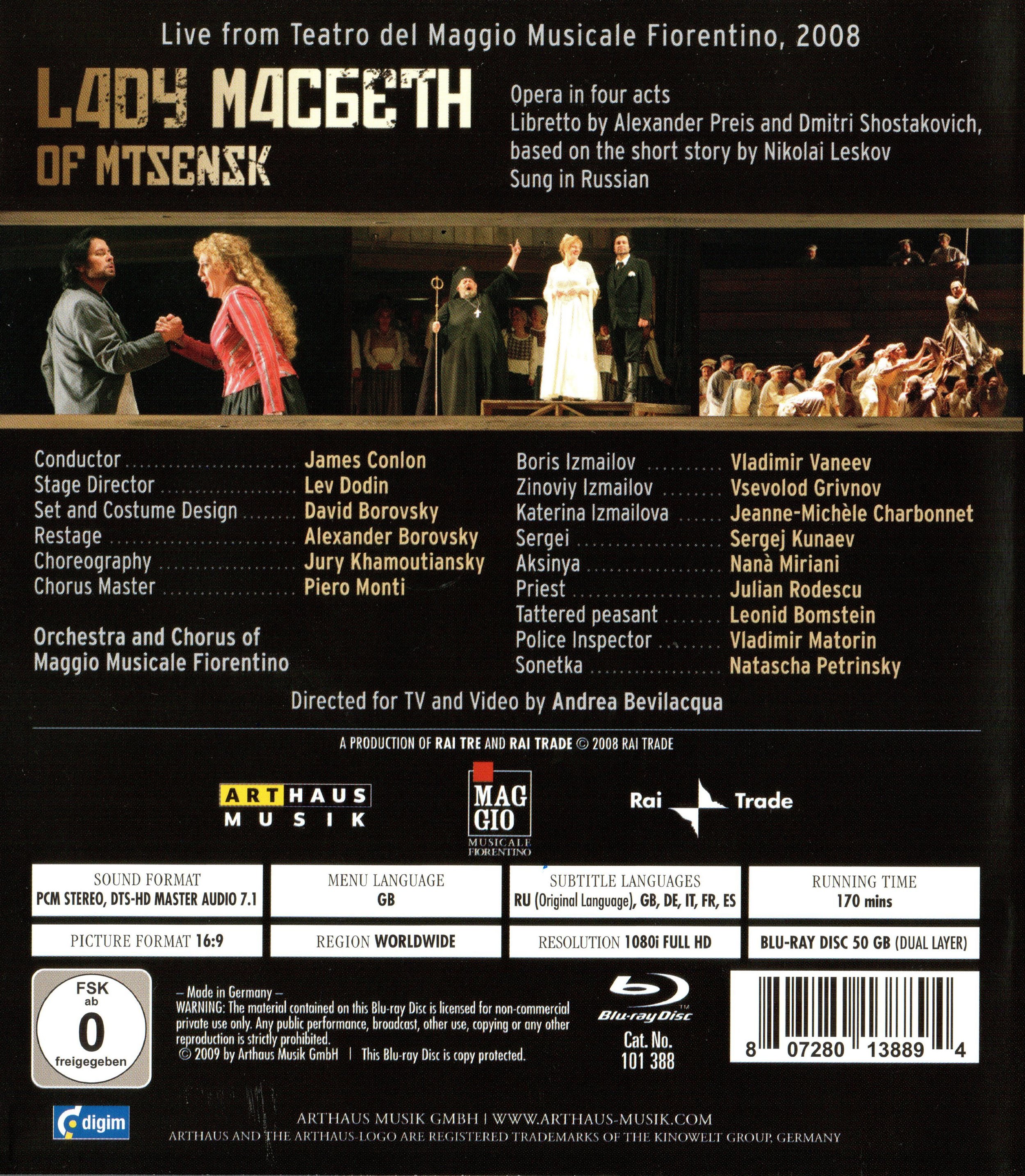

Dmitri Shostakovich Lady Macbeth of Mtsensk opera to libretto by Alexander Preis and the composer. Directed 2009 by Lev Dodin at the Teatro del Maggio Musicale Fiorentino. Stars Vladimir Vaneev (Boris Timofeyevich Ismailov/Old convict/Ghost of Boris Timofeyevich), Vsevolod Grivnov (Zinovly Borisovich Ismailov ), Jeanne-Michèle Charbonnet (Katerina Lvovna Izmailova), Sergej Kunaev (Sergei), Nanà Miriani (Aksinya), Leonid Bornstein (Tattered peasant), Andrea Cortese (Administrator), Nikolaj Bikov (Porter), Marco de Carolis (First workman), Fabio Bertella (Second Workman), Andrea Cortese (Third Workman), Saverio Bambi (Coachman), Julian Rodescu (Priest), Vladimir Matorin (Police Inspector), Andrea Snarsky (Policeman), Cristiano Olivieri (Teacher), Piergiorgio Chiavazza (Drunken guest), Armando Caforio (Sergeant), Alessandro Calamai (Sentry), Natascha Petrinsky (Sonetka), and Elena Borin (Female convict). James Conlon directs the Orchestra and Chorus of the Maggio Musicale Fiorentino (Chorus Master Piero Monti). Sets and costumes by David Borovsky; restage by Alexander Borovsky; lighting by Jean Kalman, realisation by Gianni Paolo Mirenda; acrobatic movements and choreography by Jury Khamoutiansky. Directed for TV by Andrea Bevilacqua. Sung in Russian. Released 2009, disc has 7.1 dts-HD Master Audio. Grade: B
Lady Macbeth of Mtsensk is an acquired taste. I was new to this work, but having watched it 6 times, I'm starting to catch on. Shostakovich wrote many motion picture soundtracks and works for variety stage theaters and even circuses. To me the orchestra score for Lady Macbeth resembles his popular music more than his other serious compositions. Mixed in with the manic aspects of the score are many expressive lyrical passages. The libretto adds a layer of social satire. Apparently the Soviet Russian audiences viewed the opera as an exciting crime thriller (three murders and a suicide) dressed up with social criticism of the abuses of the Tsarist era.
When Stalin and his circle went to a performance, Shostakovich thought his career would get a boost. In hindsight though, it's easy to see why Stalin was alarmed and left during the show. (If he had stayed to see the portrayal of the police and the march of the convicts to Siberia, Stalin maybe would have had the entire cast shot at curtain call.) Suddenly Shostakovich found himself in mortal danger as the Great Terror unfolded across Russia. (For more history, watch the documentary provided in the HDVD version of Keeping Score—Shostakovitch 5th Symphony with Michael Tilson Thomas.)
All this was many decades ago, but Lady Macbeth still sounds radical and modern. So how should it be staged now? Well, we happen to have two HDVDs of Lady Macbeth with competing answers. From the Maggio Musicale Fiorentino we have subject disc, a traditional staging directed by Lev Dodin. From de Nederlandse Opera we have an avant garde reading directed by shock jock Martin Kušej.
Dodin gives us a show that is tasteful in every respect. The mise-en-scene sets the action in Tsarist rural Russia sometime about 1875 with wooden building and simple costumes and props. Everybody keeps his clothes on and there are no props or actions that are inconsistent with the story. When Katerina and Sergey first make love, all you see is a jiggling light fixture and the raucous suggestive music is what gets your attention. The singing and acting is fine. The video and sound recordings are excellent. In short, with subject disc you get a mildly updated version of what Shostakovich wanted you to see and hear, and this allows you to focus on what Shostakovich had to say. Because the musical style and the content is a bit abrasive and challenging, this opera is not for everyone. But if you are willing to invest the effort you will probably enjoy repeated viewings of this title. So I give it a solid grade B.